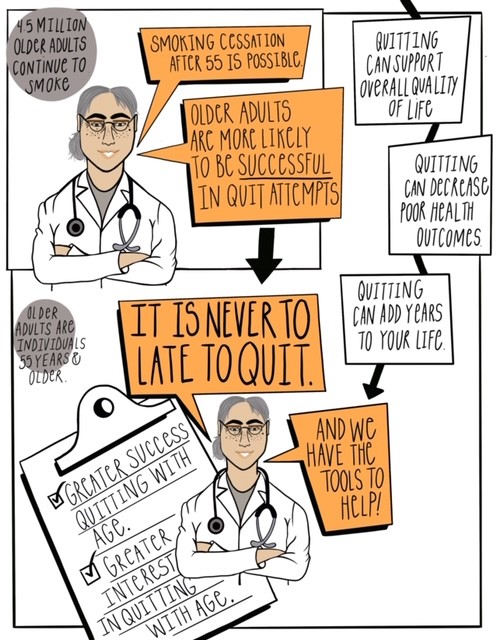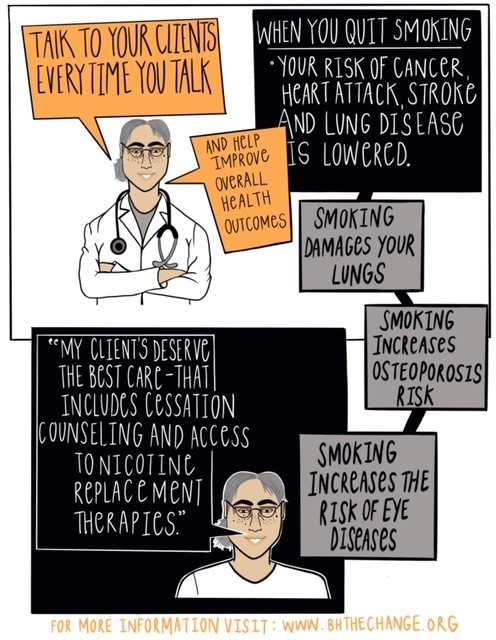In the United States, nearly 4.5 million adults over 60 continue to smoke, accounting for 70% of all deaths related to smoking, but did you know that while older adults are less likely than younger smokers to attempt to quit, they are much more likely to be successful in the cessation attempts they do make! Health providers can make a difference, as adults who experience greater health challenges with aging and psychological distress, including behavioral health issues, are more likely to be open to quitting!
Below, you’ll find a digest of available resources and information related to tobacco use and supporting cessation in older adults!
General Resources/ Information
-
- Older Adults, Behavioral Health and Smoking: It’s Never Too Late to Quit!
- Older Adults, Behavioral health and Smoking: Why Quitting Smoking is Still a Conversation Worth Having
- Older Americans Behavioral Health SAMHSA Issue Brief #11: Reaching Diverse Older Adult Populations and Engaging Them in Prevention Services and Early Interventions
- SAMHSA: Reaching & Engaging Older Adults in Behavioral Health Archived Webinar
Fact Sheets and Infographics
- Fact Sheet from National Institute on Aging: Smoking: It’s Never Too Late to Stop
- Fact Sheet from CAMH: Older Adults & Smoking- Key Messages for Health Care Providers and Policy Makers
- HHS Smoke Free 60+ Infographic: About Smokefree 60+
- HHS Smoke Free 60+ Infographic: Health Effects of Smoking
- HHS Smoke Free 60 + Infographic: What Happens When You Quit Smoking?
- HHS Smoke Fee 60 + Infographic: Household Chemicals in Cigarette Smoke
- HHS Smoke Free 60 + Infographic: Cigarette Substitutes
- Guide from National Cancer Institute: Clear Horizons- A Quit-Smoking Guide for People 50 and Older
- National Institute on Aging: How Does Smoking Affect an Older Adult’s Health? (Video)
Research Articles
- Cigarette smoking and smoking cessation among older adults: United States, 1965 – 1994 (Husten, C., Shelton, D., Chrismon, J., Lin, Y., Mowery, P., Powell, F.1997. Tobacco Control, 6, 175- 180)
- Cigarette Smoking Among the Elderly: Disease Consequences and the Benefits of Cessation (Burns, D., July 2000. American Journal of Health Promotion, 14 (6), 357-361)
- A National Survey of Older Smokers: Treatment needs of a growing population. (Orleans, C. T., Rimer, B. K., Cristinzio, S., Keintz, M. K., & Fleisher, L. 1991. Health Psychology, 10 (5), 343- 351).
- Smokers Ages 50+: Who Gets Physician Advice to Quit? (Ossip-Klein, D., McIntosh, S., Utman,C., Burton, K., Spada, J., Guido, J. 2000. Preventative Medicine, 364-69.)
- Self-help interventions for older smokers (Ossip-Klein, D., Carosella, A., Krusch, D. 1997. Tobacco Control, 188-193)
- The older smoker. Status, challenges and opportunities for intervention. (Rimer, B.K., Orleans, C.T., Keints, M.K., Cristinzio, S., Fleisher L. 1990. Chest, 97, 547-553.)
- Effectiveness of a Mobile Smoking Cessation Service in Reaching Elderly Smokers and Predictors of Quitting. (Abdullah, A., Chi, I., Ho,W., Chen, S. November 2008. BMC Geriatrics, 8:25.)
- Management of Tobacco Dependence in Older Adults: Using Evidence-Based Strategies (Andrews, J., Heath, J., Garcia, J. 2004. Journal of Gerontological Nursing, 30(12), 13-24.)
- Cigarette Use and Smoking Beliefs Among Older Americans. (Kulak, J., LaValley, S. December 2018. Journal of Addictive Diseases, 1545-0848).
- E-cigarette Marketing and Older Smokers: Road to Renormalization. (Cataldo, J., Petersen, A., Hunter,M., Wang, J., Sheon, N. 2015. Am J Health Behav; 39(3):361-371.)
Additional Resources/Information:
- https://60plus.smokefree.gov/
- National Cancer Institute’s telephone quitline, 1-877-44U-QUIT
- Local and state telephone quitlines, 1-800-QUIT-NOW
- Veterans Affairs quitline, 1-855-QUIT-VET (1-855-784-8838)
This resource digest will continue to be updated as resources are gathered so please keep checking back!
If you have resources/information on this topic that you’d like us to add to this list, please email us at BHtheChange@TheNationalCouncil.org.


